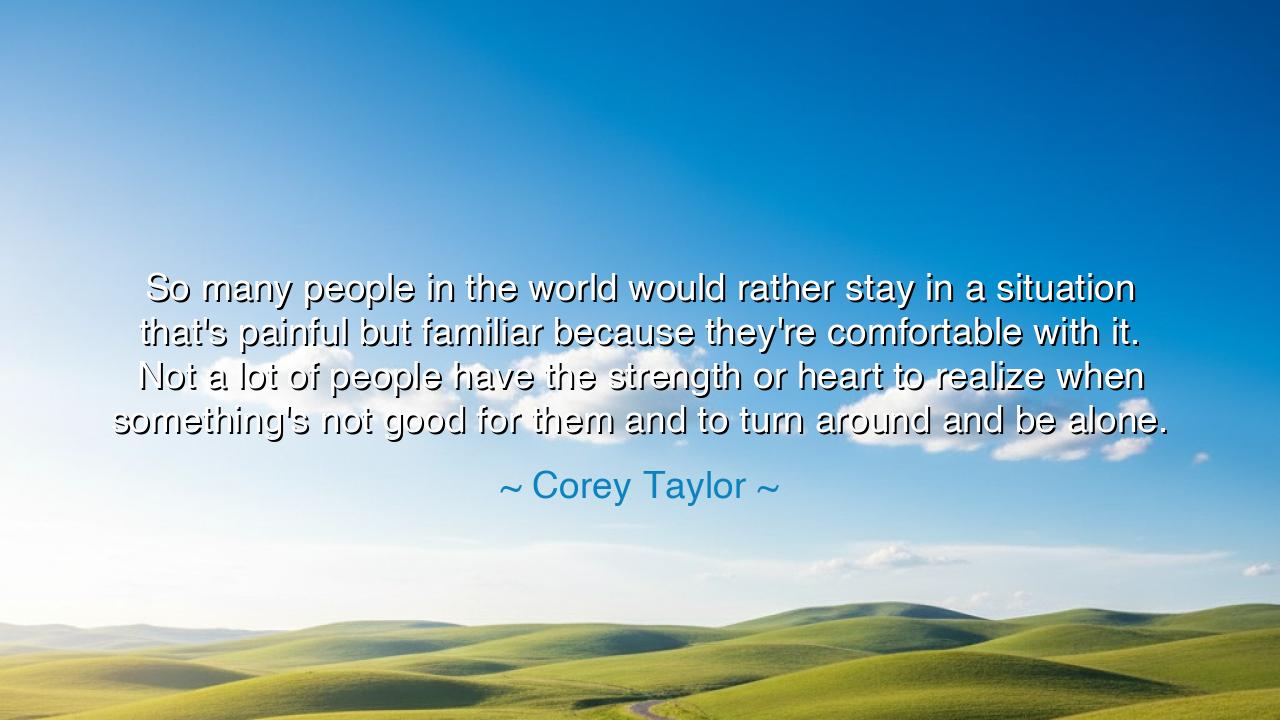
So many people in the world would rather stay in a situation
So many people in the world would rather stay in a situation that's painful but familiar because they're comfortable with it. Not a lot of people have the strength or heart to realize when something's not good for them and to turn around and be alone.






There are words spoken in our age that ring with the wisdom of the ancients, words that reveal the secret struggle of the human heart. Among these stands the reflection of Corey Taylor, who said: “So many people in the world would rather stay in a situation that’s painful but familiar because they’re comfortable with it. Not a lot of people have the strength or heart to realize when something’s not good for them and to turn around and be alone.” Though modern in voice, this truth is as old as the human soul. It speaks to that deep and dangerous bond between comfort and suffering, that strange loyalty we feel toward the chains that hurt us simply because they are known.
For it is in our nature to cling to what is familiar. The mind, like a creature of habit, fears the unknown more than it fears pain. The heart whispers, “At least I know this sorrow,” and so we remain where we bleed, mistaking familiarity for safety. Corey Taylor’s words pierce this illusion. He reminds us that true courage is not the act of enduring misery, but the act of walking away from it — of facing the vast silence of solitude rather than the noise of brokenness. To leave what wounds us, to dwell alone until we heal, requires not only strength but an awakening of the spirit.
Consider the story of Siddhartha Gautama, who would become the Buddha. He lived in luxury, surrounded by beauty, music, and comfort, yet all of it was but a golden cage. The world he knew was familiar, but it blinded him from truth. When he first beheld sickness, age, and death, he felt the trembling of his soul — the first whisper of awakening. He left behind his palace, his wife, his child, to walk alone in search of peace. His journey was one of courageous solitude, the same that Taylor speaks of: the will to abandon comfort for the sake of freedom. In time, that loneliness became enlightenment; his leaving became his liberation.
Yet not all must walk the desert to learn this truth. Every day, men and women linger in toxic relationships, soulless jobs, or dreams long dead, simply because the pain has become part of who they are. They tell themselves, “I can endure it,” or “It’s not so bad,” until endurance becomes self-destruction. To such hearts, Corey Taylor’s words come as both a mirror and a call — a mirror to reveal their bondage, and a call to choose themselves before it is too late. For there is no growth in a garden that is never weeded, no healing in a wound that is never closed.
The ancients knew that solitude is not a curse but a crucible. To be alone is not to be empty, but to be purified — to hear one’s own voice, to meet the self unmasked. The Stoics spoke of withdrawing into the “citadel of the soul,” where no storm can reach. Even the Christ, before His ministry, went into the wilderness for forty days, alone with hunger and temptation. In that solitude, He found His purpose. Thus, those who dare to step away from what harms them, even into the barren lands of loneliness, are not cowards but warriors of the spirit. They are the ones who return changed, strong, and free.
But hear this also: solitude is not the end — it is the passage. One must go through the valley of aloneness to reach the mountain of peace. When the familiar pain has been left behind, and the heart has learned to rest in its own company, new and truer connections can grow. As the phoenix rises only from ashes, so the soul is reborn when it dares to leave the fire that once consumed it. The first steps are trembling, but each one is a hymn of liberation, each tear a cleansing rain.
Therefore, let this be the lesson for all who listen: Do not mistake comfort for happiness, nor habit for peace. When you sense that something in your life steals your light, have the courage to walk away — even if the road ahead is lonely. Sit with yourself. Heal the wounds. Rebuild from within. Learn to love your own company before you seek another’s. For the strength to walk alone is the foundation of all freedom, and from such solitude blooms the purest joy.
So take these words, children of the age, and carve them upon your heart: Better the silence of solitude than the comfort of suffering. The world honors those who stand tall among others, but heaven honors those who stand tall when there is no one beside them. For only when you dare to turn away from what wounds you — only when you are brave enough to be alone — will you discover that you are never truly alone at all.






AAdministratorAdministrator
Welcome, honored guests. Please leave a comment, we will respond soon